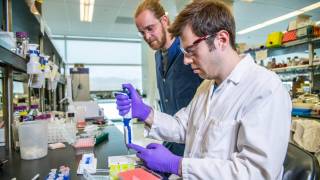Can mRNA Vaccines Defeat Herpes?

A research team at the University of Pennsylvania (UPenn) has been working on preventing and treating genital herpes (HSV-2) for years and recently found success with an mRNA vaccine approach, even before the COVID-19 pandemic.
The goals of a HSV-2 vaccine are to keep the herpes virus dormant. Or if the virus escapes, prevent it from causing symptoms.
Professor Harvey M. Friedman demonstrated success in animal models in July 2020. This study found not only targeting entry molecules, but also targeting the HS-2 ability to evade the immune system.
And, in collaboration with UPenn professor Drew Weissman, M.D., Ph.D., they are producing an mRNA vaccine. Dr. Weissman is an inventor of the COVID-19 mRNA vaccine approach, recently authorized by the U.S. Centers for Disease Control and Prevention (CDC).
The CDC stated during March 2021, mRNA vaccines teach human cells how to make a protein, or even just a piece of a protein, that triggers an immune response inside our bodies.
The benefit of mRNA vaccines, like all vaccines, is those vaccinated gain protection without ever having to risk the severe consequences of getting sick.
In the past, HSV-2 prevention vaccine clinical studies (Chiron 1999, GSK 2002 & 2012) targeted the molecules that the herpes virus needed to enter cells using a protein vaccine. These showed some benefits but did not meet the trial designs’ primary endpoints of preventing genital disease.
In the herpes animal models of mice and guinea pigs, the antibody response was found three times greater, and the CD4 T-cells were ten times better with the mRNA vaccine than the protein vaccine.
This superior molecular response was consistent with symptom reduction - the mRNA vaccine was perfect in preventing genital disease (100%) and significantly reduced recurrent disease (98%).
The duration and strength of the mRNA vaccine candidate protection were also better compared to a protein vaccine.
Studying guinea pigs over eight months, equivalent to 20 years in humans, the antibody response was 10x better with the mRNA vaccine after their vaccination. The mRNA vaccine reduced days with the genital disease to <1%, compared to 20% with the protein vaccine.
The risk of transmission (measured by days) was 2% with the protein vaccine, compared to 0% with the mRNA vaccine.
Dr. Friedman says a therapeutic vaccine needs to stimulate CD8 T-cells as opposed to CD4 T-cells.
On February 12, 2021, Dr. Friedman offered his insights in a free video hosted by Blue Jeans.
Dr. Friedman is ready to launch a herpes mRNA vaccine phase 1 human trial in early 2022. He and UPenn have established a donation page to accelerate the funding for this research. The donation page can be found on this webpage.
PrecisionVaccinations publishes research-based vaccine news.
Our Trust Standards: Medical Advisory Committee

























